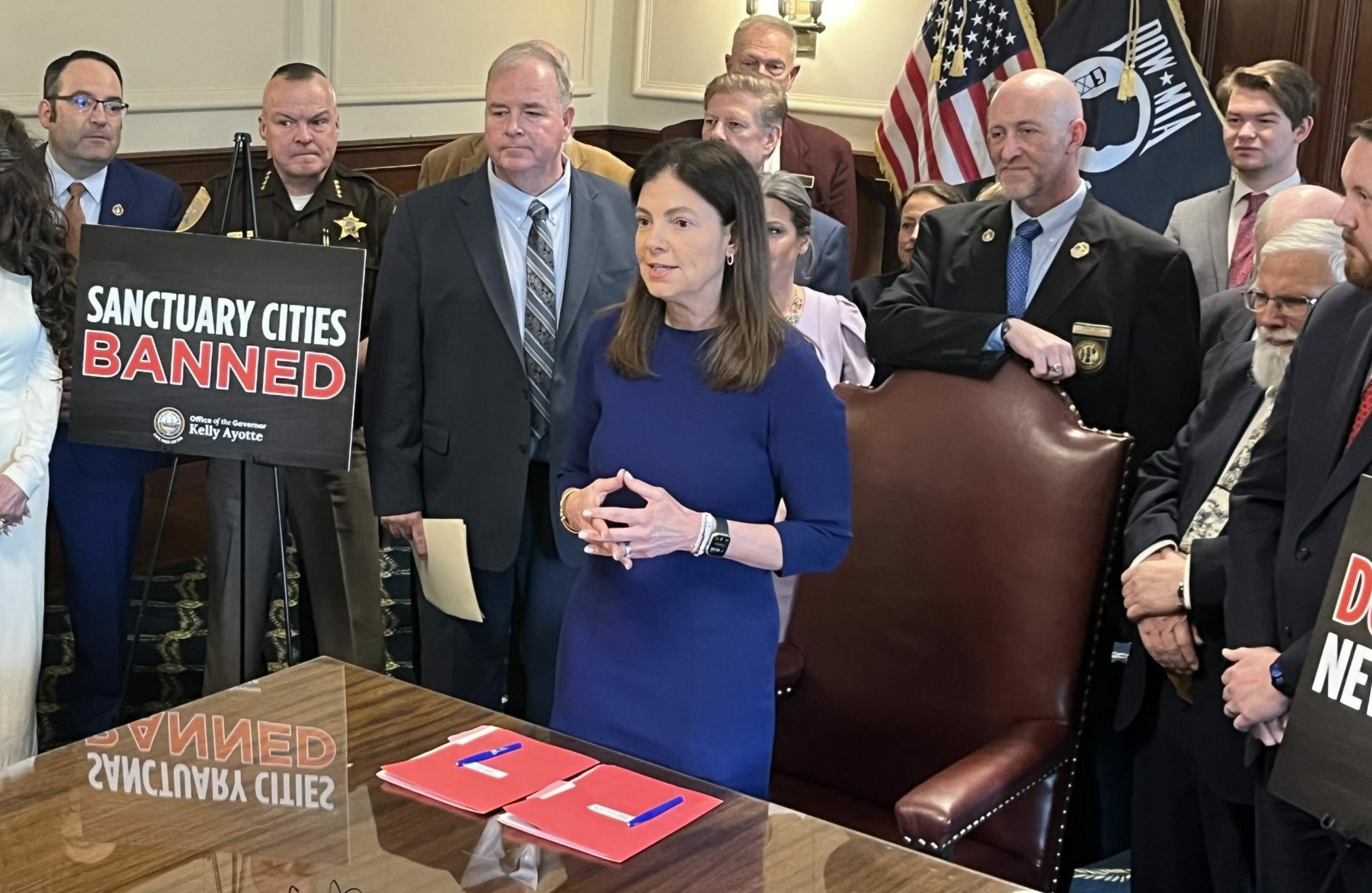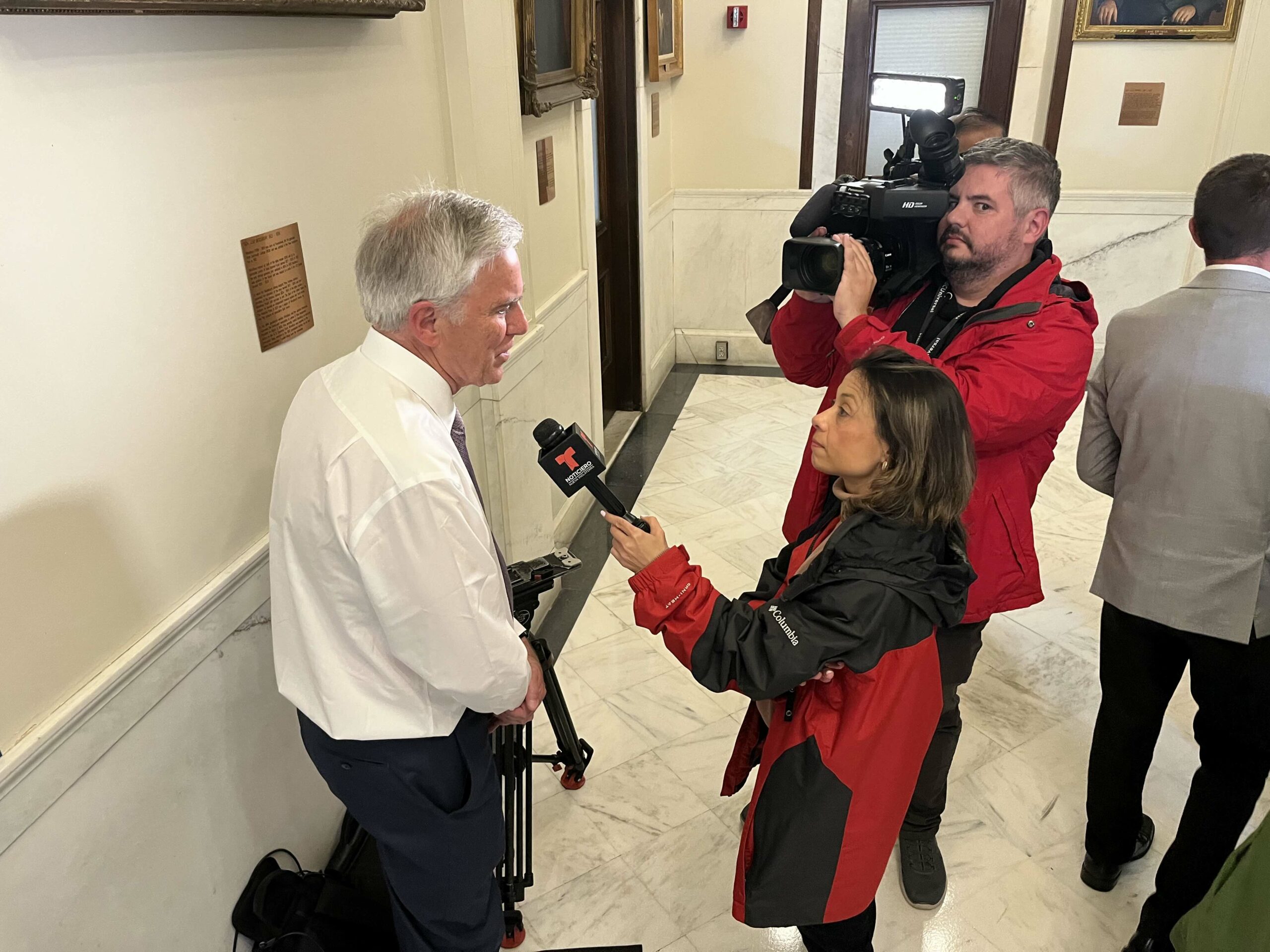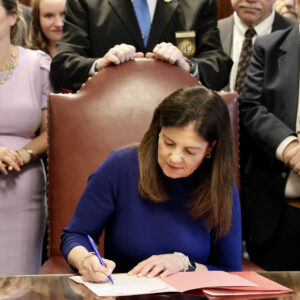“There will be no sanctuary cities in New Hampshire. Period. End of story.”
And with a few strokes of her pen, Gov. Kelly Ayotte on Thursday made the Granite State the first in New England to officially ban local ordinances restricting local law enforcement from working with federal immigration officials.
It was a promise she made to voters during her successful gubernatorial campaign against a Democrat, former Manchester Mayor Joyce Craig, who tried to evade the illegal immigration issue.
Now, less than six months into her first year in the Corner Office, Ayotte added the ban to a growing list of legislative victories.
“I look at the governor and I think, ‘Wow,’” Sen. Bill Gannon (R-Sandown) said just before Ayotte signed a pair of House and Senate bills into law. “She made promises, she kept them.”

Gov. Kelly Ayotte discusses legislation to ban sanctuary city policies in New Hampshire on May 22, 2025.
Gannon, a prime sponsor of SB 62, joined a group of Republican lawmakers and state law enforcement officials for Thursday’s signing. Rep. Joe Sweeney (R-Salem) sponsored HB 511 and said lawmakers are “sending a clear message” that “if you are in this nation illegally, you are not welcome in the state of New Hampshire.”
Together, the two bills require local law enforcement to comply with federal Immigration and Customs Enforcement detainers “if safe to do so,” and allow for the state attorney general to sue jurisdictions that continue to flout the ban through so-called “sanctuary” or “welcoming” ordinances.
“The leadership team made this a priority from day one in our contract with New Hampshire to ban sanctuary cities and sanctuary policies and anything that they want to call it — welcoming policies, those are banned too,” Sweeney added. “We’re not going to have any elected officials in the state of New Hampshire get in the way of law enforcement keeping our state safe.”
Earlier this week, elected town officials in Franconia discussed adopting a sanctuary policy.
“I know there can be some repercussions. But I think it’s important enough that we address this and we send a message,” said Selectman Eric Meth.
Asked about the situation in Franconia and other sanctuary communities like Lebanon and Hanover, Ayotte told NHJournal those municipalities “are no longer going to be able to do that.”
“Having a consistent policy for the state on this issue is the safest thing we can do for New Hampshire, and having a consistent policy is what these bills do,” she said.
In a statement issued following the event, Ayotte doubled down on what wound up being a winning campaign message last fall.
“I said from the beginning that we won’t let our state go the way of Massachusetts and their billion-dollar illegal immigrant crisis,” she stated. “Today, we’re delivering on our promise by banning sanctuary cities and supporting law enforcement cooperation with federal immigration authorities.”
Sweeney also issued a statement that appeared to be aimed at turning up the heat on dissenting Democrats.
“The fact is, 161 House and eight Senate Democrats tried to obstruct this critical legislation, but Republicans stood strong in rejecting sanctuary policies,” Sweeney stated. “Unlike the radical, extreme, and dangerous open-border policies of New Hampshire Democrats, Republicans are prioritizing public safety and ensuring that we keep New Hampshire a land of law and order.”
No Democratic lawmakers joined their Republican colleagues to celebrate Thursday’s twin bill signings, although Rep. David Meuse (D-Portsmouth) stood on the other side of the Executive Council chambers and observed the proceedings.
Meuse made his own headlines in the sanctuary city story. After years of denouncing anti-sanctuary city legislation as racist and xenophobic, the Portsmouth progressive reversed his stance in January and joined his fellow House Criminal Justice and Public Safety Committee Democrats, who voted unanimously in favor of a sanctuary city ban. Asked about his flip-flop, Meuse claimed — falsely — that “the bill has the support of ACLU-NH and the Immigrant Rights Network here in New Hampshire.”
But by April, Meuse and his fellow progressives had flipped again and once more opposed increased immigration enforcement.
“A border is only a line on a map,” Rep. Chris Muns (D-Hampton) said at the time.
Supporting sanctuary cities puts New Hampshire Democrats at odds with most voters, polling shows. For example, three out of four Americans support denying federal funds to sanctuary cities, an NPR poll found.

Rep. David Meuse (D-Portsmouth) talks to a reporter from Telemundo after Gov. Kelly Ayotte signs a ban on sanctuary cities, May 22, 2025
Asked by NHJournal what made his party revert to opposing a crackdown on sanctuary policies, Meuse blamed Trump’s federal enforcement practices.
“We’d had very little opportunity to sort of see how this plays out,” Meuse said, referencing the first few weeks under the new chief executive. “So, I think what changed for us was seeing the video of a Tufts student dragged away by masked agents and having people deported to El Salvador without due process.”
Meuse added that the issue does not affect New Hampshire as much as in other states.
“Statistically, immigrants are the least likely people to commit crimes,” he said. “Is this an issue elsewhere in the country? Yes, it is.
“Has it been an issue in New Hampshire? No, in large part, it’s a manufactured issue.”
Gannon, in his remarks, however, referenced the 2022 killing of a Nashua woman by a Honduran national living in the country illegally.
“Julie Graichen from Nashua, she was killed by a Honduran who had been twice deported, came back again, committed crimes in Nashua, and then killed this young woman,” Gannon said. “Governor, we can’t let that happen again.”
Mark Krikorian with the Center for Immigration Studies, an organization that promoted immigration law enforcement and border security, praised New Hampshire’s actions.
“New Hampshire’s citizens will be safer because of the ban on sanctuary policies. Every crime committed by someone who has no right to be in this country could have been prevented by proper immigration enforcement, and that requires cooperation between federal, state, and local agencies. It’s now up to the governor and his people to make sure this is enforced, and that local police and county jails don’t get away with implementing stealth sanctuary policies.”





